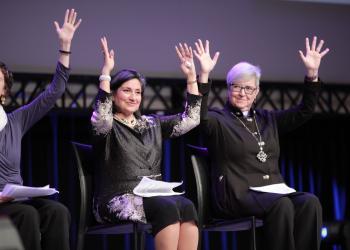Gender equality comes into sharp focus at world's largest interfaith gathering
Advancing towards a world that protects and provides for all-- women and men alike— depends on the leadership, insight, wisdom, and decision-making of women of faith and the full support and participation of men, the Baha'i International Community said at the world's largest interfaith gathering.
More than 7,000 people attended the Parliament of the World's Religions in Toronto, Canada on 1-7 November on the theme of inclusion, reconciliation and social change.
The theme of the equality of men and women came into sharp focus throughout contributions by representatives of the Baha’i International Community.
“As long as women are prevented from attaining their highest possibilities”, the Baha’i writings state, “so long will men be unable to achieve the greatness which might be theirs,” said Bani Dugal, Principal Representative of the Baha'i International Community United Nations Office on a keynote panel on women's leadership in religious traditions.
"This is not to say that men cannot be in the forefront of the movement toward gender equality, in fact “when men own the equality with women, there will be no need for women to struggle for their rights” (Baha’i writings). Just as a biological organism requires the coordinated action of all its component parts to be healthy, society needs the talents and gifts of all its members—and not just some—to be strong. This includes gifts of coordination, decision-making, and leadership."
Speaking alongside Jewish, Christian, Buddhist and Muslim religious leaders, Ms. Dugal added: "Improving women’s religious leadership requires that men and boys be educated in such a way that they will come to understand the ways in which society suffers and is impoverished when women’s voices, experiences, and intellectual contributions are not acknowledged. Enlightened and supportive men are critical."
The parliament included more than 500 events and keynote speeches by religious and community leaders and members of NGOs. Over 180 Baha’is were in attendance at the annual conference this year which has been hosted ongoing for 125 years. The parliament was also the first public space to mention the Baha’i Faith in 1893.
A side event on religion, citizenship and belonging co-hosted by the Baha'i International Community and the Office of Public Affairs of the Baha’i Community of Canada explored insights from the work of the BIC at the UN and current challenges being faced.
Saphira Rameshfar, Baha'i International Community Representative to the UN, explained how the principles of building unity and consultation are at the heart of the work of the office.
"In its engagement with the United Nations, the BIC has demonstrated an approach characterized by a focus on coherence between the means and ends of social transformation. The governing body of the Baha’i Faith states: “It is not possible to build enduring unity through endeavors that require contention.
"The BIC instead, offers a new perspective on the manner in which gender equality is pursued at the international level. This is the avoidance of an adversarial approach, or any engagement in partisan politics. This aims to protect the Baha’i community from structural and ideological divisions and the culture of contest, so deeply rooted in multi-party political systems.
"Baha’is are guided by their scriptures to adopt the practice of consultation in all instances of collective deliberation and decision making. Consultation is an approach to collective deliberation that seeks to be unifying rather than divisive. This consultative approach presents a sharp contrast to the adversarial methods of debate, partisanship and protest that find expression in the culture of UN deliberations."
Other contributions of the BIC during the parliament included a major speech on the equality of men and women: divine imperative for an age of transition and a side event on the how to use the United Nations Sustainable Development Goals (SDGs) to translate love into inclusive action.
______
Active in various global fora, the Baha’i International Community maintains representational offices to the UN in New York and Geneva, as well as regional offices in Addis Ababa, Brussels, and Jakarta.
The Baha’i International Community registered with the UN as an NGO in 1948 and currently has consultative status with the United Nations Economic and Social council (ECOSOC) and the United Nations Children's Fund (UNICEF), as well as accreditation with the United Nations Environmental Program (UNEP) and the United Nations Department of Public Information (DPI).
Follow the Baha’i International Community on Twitter, Facebook and Insta
______
For media inquiries, contact:
Rayyan Sabet
Senior Information Officer
(+1) 347-282-1482
[email protected]
